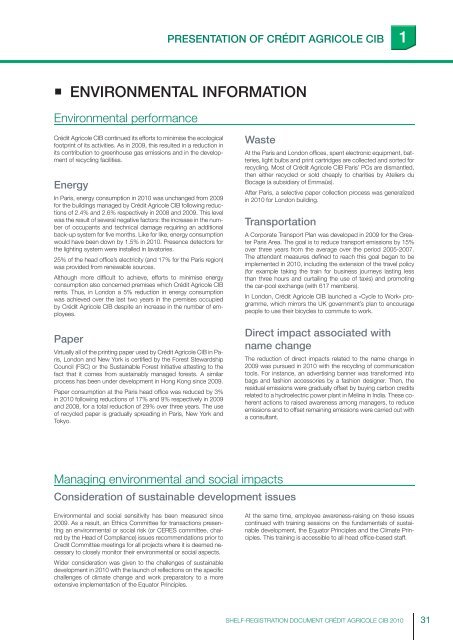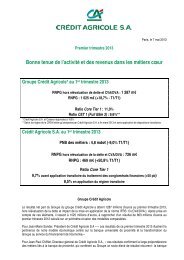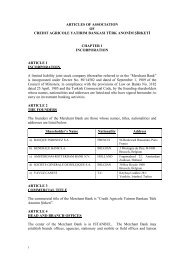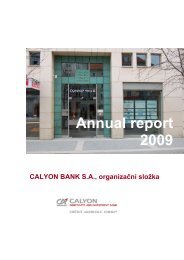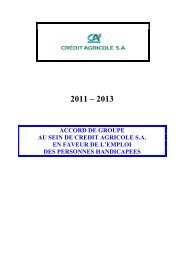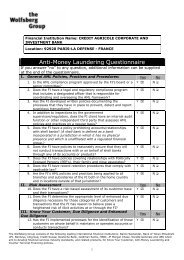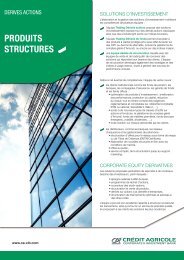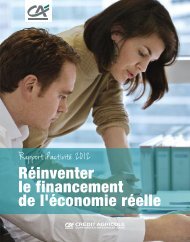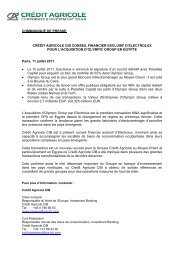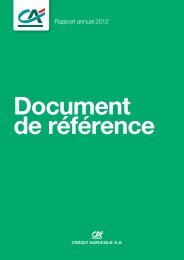ourexpertise - Crédit Agricole CIB
ourexpertise - Crédit Agricole CIB
ourexpertise - Crédit Agricole CIB
You also want an ePaper? Increase the reach of your titles
YUMPU automatically turns print PDFs into web optimized ePapers that Google loves.
PRESENTATION OF CRÉDIT AGRICOLE <strong>CIB</strong> 1• ENVIRONMENTAL INFORMATIONEnvironmental performance<strong>Crédit</strong> <strong>Agricole</strong> <strong>CIB</strong> continued its efforts to minimise the ecologicalfootprint of its activities. As in 2009, this resulted in a reduction inits contribution to greenhouse gas emissions and in the developmentof recycling facilities.EnergyIn Paris, energy consumption in 2010 was unchanged from 2009for the buildings managed by <strong>Crédit</strong> <strong>Agricole</strong> <strong>CIB</strong> following reductionsof 2.4% and 2.6% respectively in 2008 and 2009. This levelwas the result of several negative factors: the increase in the numberof occupants and technical damage requiring an additionalback-up system for fi ve months. Like for like, energy consumptionwould have been down by 1.5% in 2010. Presence detectors forthe lighting system were installed in lavatories.25% of the head offi ce’s electricity (and 17% for the Paris region)was provided from renewable sources.Although more diffi cult to achieve, efforts to minimise energyconsumption also concerned premises which <strong>Crédit</strong> <strong>Agricole</strong> <strong>CIB</strong>rents. Thus, in London a 5% reduction in energy consumptionwas achieved over the last two years in the premises occupiedby <strong>Crédit</strong> <strong>Agricole</strong> <strong>CIB</strong> despite an increase in the number of employees.PaperVirtually all of the printing paper used by <strong>Crédit</strong> <strong>Agricole</strong> <strong>CIB</strong> in Paris,London and New York is certifi ed by the Forest StewardshipCouncil (FSC) or the Sustainable Forest Initiative attesting to thefact that it comes from sustainably managed forests. A similarprocess has been under development in Hong Kong since 2009.Paper consumption at the Paris head offi ce was reduced by 3%in 2010 following reductions of 17% and 9% respectively in 2009and 2008, for a total reduction of 29% over three years. The useof recycled paper is gradually spreading in Paris, New York andTokyo.WasteAt the Paris and London offi ces, spent electronic equipment, batteries,light bulbs and print cartridges are collected and sorted forrecycling. Most of <strong>Crédit</strong> <strong>Agricole</strong> <strong>CIB</strong> Paris’ PCs are dismantled,then either recycled or sold cheaply to charities by Ateliers duBocage (a subsidiary of Emmaüs).After Paris, a selective paper collection process was generalizedin 2010 for London building.TransportationA Corporate Transport Plan was developed in 2009 for the GreaterParis Area. The goal is to reduce transport emissions by 15%over three years from the average over the period 2005-2007.The attendant measures defi ned to reach this goal began to beimplemented in 2010, including the extension of the travel policy(for example taking the train for business journeys lasting lessthan three hours and curtailing the use of taxis) and promotingthe car-pool exchange (with 617 members).In London, <strong>Crédit</strong> <strong>Agricole</strong> <strong>CIB</strong> launched a «Cycle to Work« programme,which mirrors the UK government’s plan to encouragepeople to use their bicycles to commute to work.Direct impact associated withname changeThe reduction of direct impacts related to the name change in2009 was pursued in 2010 with the recycling of communicationtools. For instance, an advertising banner was transformed intobags and fashion accessories by a fashion designer. Then, theresidual emissions were gradually offset by buying carbon creditsrelated to a hydroelectric power plant in Melina in India. These coherentactions to raised awareness among managers, to reduceemissions and to offset remaining emissions were carried out witha consultant.Managing environmental and social impactsConsideration of sustainable development issuesEnvironmental and social sensitivity has been measured since2009. As a result, an Ethics Committee for transactions presentingan environmental or social risk (or CERES committee, chairedby the Head of Compliance) issues recommendations prior toCredit Committee meetings for all projects where it is deemed necessaryto closely monitor their environmental or social aspects.Wider consideration was given to the challenges of sustainabledevelopment in 2010 with the launch of refl ections on the specifi cchallenges of climate change and work preparatory to a moreextensive implementation of the Equator Principles.At the same time, employee awareness-raising on these issuescontinued with training sessions on the fundamentals of sustainabledevelopment, the Equator Principles and the Climate Principles.This training is accessible to all head offi ce-based staff.SHELF-REGISTRATION DOCUMENT CRÉDIT AGRICOLE <strong>CIB</strong> 2010 31


